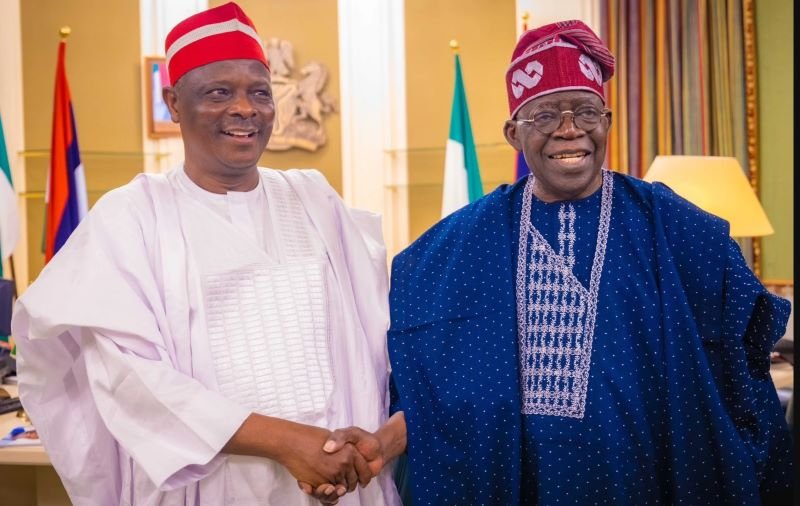WITH political alignments and power plays already underway ahead of the 2027 general elections, the Presidency has dismissed speculations surrounding President Bola Ahmed Tinubu’s recent meeting with New Nigeria People’s Party (NNPP) leader, Senator Rabiu Musa Kwankwaso, describing it as a normal and expected political engagement.
Abdulaziz Abdulaziz, Senior Special Assistant to the President on Print Media, made this clarification during an appearance on Channels Television’s The Morning Brief on Monday monitored by News Point Nigeria, insisting that there is nothing illegal or unusual about politicians talking across party lines especially those with longstanding relationships like Tinubu and Kwankwaso.
“Politicians talk; it’s not a sin talking across lines. The presidency or friends of the president talking to Kwankwaso or the other way round should not be seen as anything strange,” Abdulaziz said.
He emphasized that both men share a political history dating back over three decades and have been allies at different stages in Nigeria’s democratic journey.
Shedding light on their connection, Abdulaziz, an indigene of Kano noted that Tinubu and Kwankwaso were elected into the National Assembly during the botched Third Republic in 1993, and again in 1999 when both served as state governors, Tinubu in Lagos and Kwankwaso in Kano.
“There is a very longstanding relationship between the two. So, there is nothing strange about them talking or reuniting under any political arrangement,” he explained.
The remarks come amid growing speculation that Tinubu may be courting Kwankwaso as part of a broader strategy to neutralize the emerging opposition coalition, particularly in the northern region where Kwankwaso maintains a formidable grassroots following through his red-capped political movement, Kwankwasiyya.
Abdulaziz also addressed recent political defections to the All Progressives Congress (APC), including the switches made by Governors Umo Eno of Akwa Ibom and Sheriff Oborevwori of Delta State both formerly of the Peoples Democratic Party (PDP).
He denied claims that the Federal Government was coercing opposition governors or leaders to join the APC, attributing their defection to Tinubu’s personal political style and long-standing relationships.
“President Tinubu is a consensus-builder. He is approachable, open, and maintains old political friendships. Most of those who are decamping are doing so because of these relationships not coercion,” Abdulaziz said.
With the recent defections, the APC now controls 23 out of 36 states, the PDP 10, while the NNPP, Labour Party, and APGA hold one state each.
As the 2027 presidential election draws nearer, political watchers believe Kano State, Nigeria’s second-most populous state will once again play a pivotal role. In the 2023 presidential elections, Kano saw a massive voter turnout, with Kwankwaso’s NNPP dominating.
Out of over 1.7 million total votes cast in Kano:
Kwankwaso scored 997,279 votes
Tinubu polled 517,341 votes
Atiku Abubakar managed 131,716
Peter Obi of the Labour Party received just 28,513 votes
Kwankwaso won in 38 of the state’s 44 local governments, reinforcing his influence in a state often considered the electoral heartland of the North.
At the national level, Kwankwaso came fourth in the 2023 presidential race, polling 1,496,687 votes, trailing behind Tinubu, Atiku, and Obi.
A strategic alliance with Kwankwaso could deliver a significant bloc of northern votes to Tinubu, blunting the impact of a united front by his closest 2023 rivals.
However, Abdulaziz downplayed any such speculation, insisting that political conversations do not necessarily translate into endorsements or alliances.
“People realign and shape their political positions. That’s how politics works, it’s not treachery, it’s strategy,” he added.







